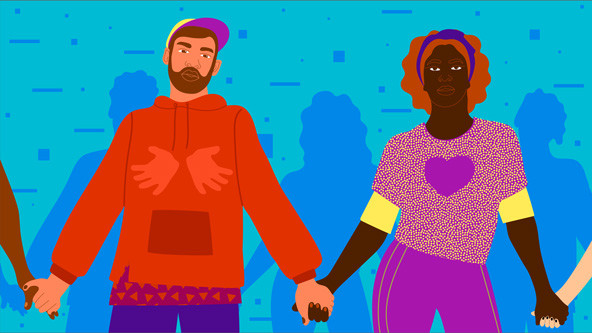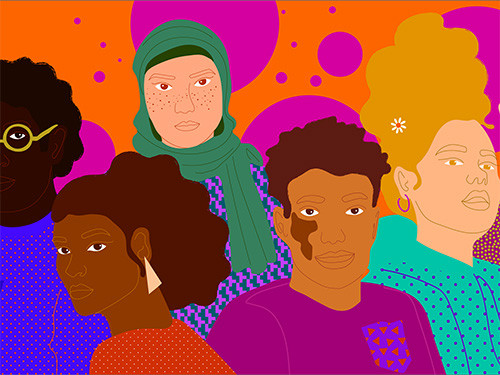 (Illustration by Aurélia Durand)
(Illustration by Aurélia Durand)
For those committed to advancing racial equity in philanthropy, how do we find and stay with our learning edge—what Laura Shubilla and Chris Sturgis call “the edge of our comfort zone and competence?” Moreover, how do we do so when we focus our efforts locally in organizations and communities yet live in and ultimately have an impact on a global society?
Philanthropy’s growing embrace of diversity, equity, and inclusion requires retooled, if not fully reimagined, structures and practices that can advance racial and economic justice. And as philanthropy’s efforts cross borders, we must recognize the limitations of the dominant Western framework that confuses evolution for progress and which places humans at the pinnacle of all life”

We are practitioners working in philanthropy, specifically at the crossroads of strategy and evaluation, where data-informed decisions determine who gets funding and who does not, in what amount, and to what end. For us, the intersection of strategy and evaluation is contextualized, personalized, values-informed, and in service of an emerging world—transformative and freeing.
To realize this aspiration, we embrace our full identities and commit to practices that push our learning edges as black American, heterosexual, cisgender women. And as we pursue equitable processes and outcomes locally and globally, we turn to four practices to help us center race through an intersectional lens.
1. Ask a 'Real Question'
Carol Gilligan, New York University professor and author of In a Different Voice, teaches a methodological course on psychological inquiry in which she asks her students to write a “real question” about which they are truly curious. This prompt invites students to step away from standpoints of expertise toward one of learning. Gilligan devises this question in two columns for students to contemplate: “What I know about my question” and “What I don’t know about my question.” What generally unfolds is that, upon first attempt, most students find that they know a lot about what they didn’t know. Students repeated the assignment, making their knowing paradigms visible. Then the breakthrough: Students begin to formulate “real questions”—actual questions that held their curiosity—without preconceived or realized answers. This becomes the launching point for inquiry, for considering who might inform the question, and for preparing to listen.
2. Name Orthodoxies
Orthodoxies often are invisible, masquerading as “common sense.” They guide what is considered valid, trustworthy, and rigorous, and people believe them to be foundational. As practitioners, we must name and push against these norms, particularly if they reinforce a stance that diminishes the insights and intelligence of those who differ from us. For instance, the belief that quantitative measures are the gold standard of truth deny indications of change that are narrative, verbal, and, at best, an integration of all three. Accepted ways of being must be interrogated from a place of curiosity. Whose intentions, beliefs, and biases led us to these practices? Given our identities, our training, and our experiences, how do we simultaneously unlearn and create something new, particularly if we seek racial and economic justice? At Luminare Group, Jara Dean-Coffey (this article’s coauthor) and her colleagues have deliberated these questions as longtime partners to foundations that seek fair and just societies. The Equitable Evaluation Initiative (EEI) is an organizing and change effort incubated by Luminare Group. As the national director, Jara works in partnership with others in the philanthropic ecosystem to co-create evaluative practice that in itself is an instrument of and for equity in all places.
3. Shift the Center and Share Power
Holding the complexity of meeting people in their fully human, multiple identities is essential to racial equity. When we shift the center, we extend W.E.B. DuBois’s notion of double consciousness, the sense of having a social identity in two parts, with one part of that identity oppressed. For DuBois, to be African American was to understand his self through multiple, sometimes conflicting, lenses that renders part of a person’s self invisible: He knew he was discriminated against as a member of a subjugated racial group, but he also identified with a broader American identity.
Using an intersectional lens allows for the recognition and centering of multiple, traditionally marginalized identities. As we shift the center, we must also share power. Philanthropy and evaluation prioritize particular ways of thinking based on quantitative reasoning, definitions of evidence, and ideas around worth and merit. They continuously reassert privilege and power through knowledge creation. Others in this ecosystem, including PhD students or nonprofit partners, must comply if they are to obtain and maintain access to resources and be deemed of value. We acknowledge that the roots of philanthropy and evaluation are firmly grounded in power.
Equity—both racial and economic—requires us to be in relationship, in proximity, and in a position of interdependence as the path to our collective health and well-being. Sharing power means asking grantee partners about their vision for community well-being using the related outcomes to guide evaluation efforts. And it means turning an evaluative lens on our efforts so that we can continuously improve our practice.
4. Mind Yourself
If we are to function with any degree of success in complex systems in the United States and beyond, we have to not only become comfortable with, but also embrace the multiple realities—and histories—of people and communities. We have to seek epistemological and ontological frames that challenge us. We must seek definitions of evidence, truth, and rigor that reflect the complexity of the issues we seek to address, the intersectional identities of all humans, and the historical and sociopolitical context that has brought us to this point. For example, in their respective work, Joan LaFrance, Fiona Cram, and Hayley Marama Cavino, offer indigenous frameworks for evaluative work that centers culture and seeks to be an expression of liberation. These frameworks acknowledge, among other things, multiple truths, interdependence, and that time is non-linear. It would behoove us to listen and learn from those whose mindsets, experiences, and approaches stem from a belief in the collective as our philanthropic strategies move toward greater complexity (and sometimes even chaos) and increasingly reach beyond our local and regional boundaries.
Moving Forward
We are habituated to centering ourselves and our institutions, so we must seek the edges of our comfort zone and competence if we are to realize equitable processes and outcomes. The four learning edge practices unsettle us such that we can stay curious and ask real questions. They are not only about whom we listen to but how we listen and how we interpret. It’s the way we analyze and make sense of the information we glean and the degree to which we allow the multiplicity of what we hear to inform our actions and decisions.
It’s the natural human tendency to want to create order in complex, adaptive systems. In that desire to make meaning, we must not lose sight of acknowledging and challenging paradigms that shape our worlds and work. To advance equity locally and globally, we must build a future that embraces the complexity of our varied histories and experiences—our own personal histories and experiences, our organizations’ collective histories and experiences, and the stories, both past and present, of our partner organizations.
We continue the work of our ancestors toward an imagined future centered on love.
Support SSIR’s coverage of cross-sector solutions to global challenges.
Help us further the reach of innovative ideas. Donate today.
Read more stories by Chera Reid & Jara Dean-Coffey.

